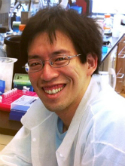α-Ketoglutarate links p53 to cell fate during tumour suppression Research Letter
| Authors: | Morris, J. P. 4th; Yashinskie, J. J.; Koche, R.; Chandwani, R.; Tian, S.; Chen, C. C.; Baslan, T.; Marinkovic, Z. S.; Sánchez-Rivera, F. J.; Leach, S. D.; Carmona-Fontaine, C.; Thompson, C. B.; Finley, L. W. S.; Lowe, S. W. |
| Title: | α-Ketoglutarate links p53 to cell fate during tumour suppression |
| Abstract: | The tumour suppressor TP53 is mutated in the majority of human cancers, and in over 70% of pancreatic ductal adenocarcinoma (PDAC)1,2. Wild-type p53 accumulates in response to cellular stress, and regulates gene expression to alter cell fate and prevent tumour development2. Wild-type p53 is also known to modulate cellular metabolic pathways3, although p53-dependent metabolic alterations that constrain cancer progression remain poorly understood. Here we find that p53 remodels cancer-cell metabolism to enforce changes in chromatin and gene expression that favour a premalignant cell fate. Restoring p53 function in cancer cells derived from KRAS-mutant mouse models of PDAC leads to the accumulation of α-ketoglutarate (αKG, also known as 2-oxoglutarate), a metabolite that also serves as an obligate substrate for a subset of chromatin-modifying enzymes. p53 induces transcriptional programs that are characteristic of premalignant differentiation, and this effect can be partially recapitulated by the addition of cell-permeable αKG. Increased levels of the αKG-dependent chromatin modification 5-hydroxymethylcytosine (5hmC) accompany the tumour-cell differentiation that is triggered by p53, whereas decreased 5hmC characterizes the transition from premalignant to de-differentiated malignant lesions that is associated with mutations in Trp53. Enforcing the accumulation of αKG in p53-deficient PDAC cells through the inhibition of oxoglutarate dehydrogenase-an enzyme of the tricarboxylic acid cycle-specifically results in increased 5hmC, tumour-cell differentiation and decreased tumour-cell fitness. Conversely, increasing the intracellular levels of succinate (a competitive inhibitor of αKG-dependent dioxygenases) blunts p53-driven tumour suppression. These data suggest that αKG is an effector of p53-mediated tumour suppression, and that the accumulation of αKG in p53-deficient tumours can drive tumour-cell differentiation and antagonize malignant progression. |
| Journal Title: | Nature |
| Volume: | 573 |
| Issue: | 7775 |
| ISSN: | 0028-0836 |
| Publisher: | Nature Publishing Group |
| Date Published: | 2019-09-26 |
| Start Page: | 595 |
| End Page: | 599 |
| Language: | English |
| DOI: | 10.1038/s41586-019-1577-5 |
| PUBMED: | 31534224 |
| PROVIDER: | scopus |
| PMCID: | PMC6830448 |
| DOI/URL: | |
| Notes: | Source: Scopus |
Altmetric
Citation Impact
BMJ Impact Analytics
MSK Authors
Related MSK Work














